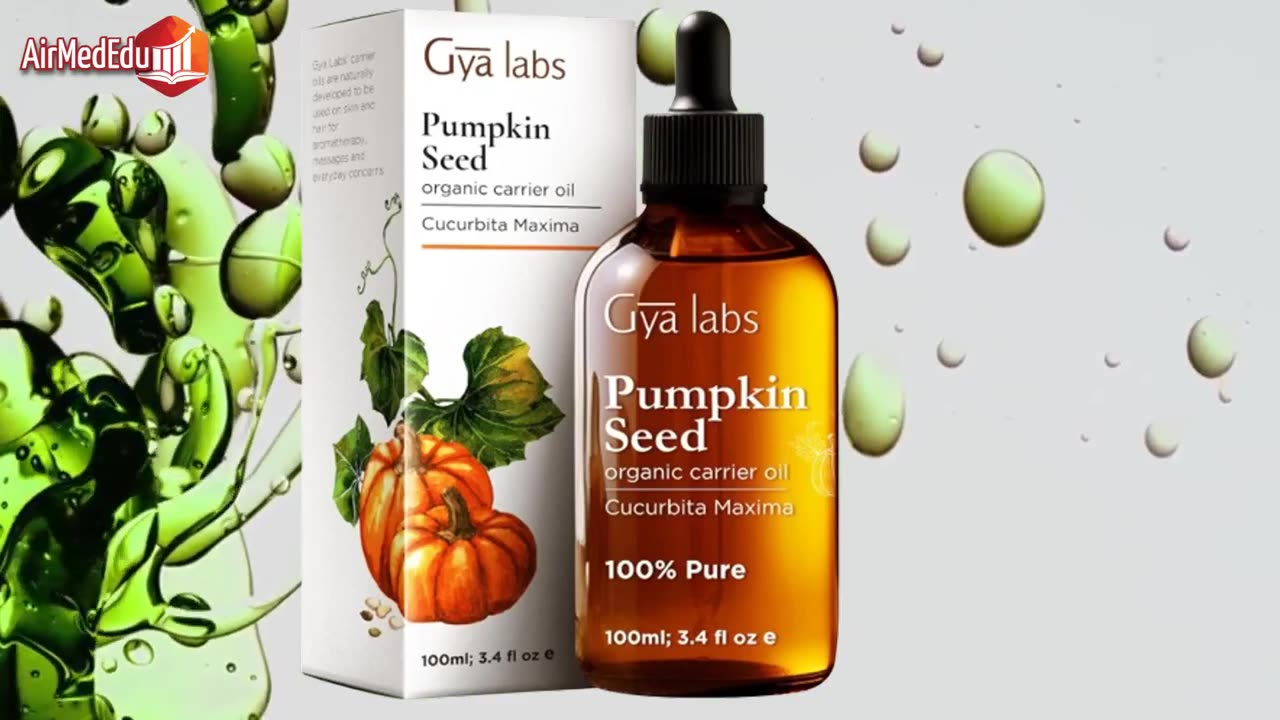Premium Only Content

Pumpkin Seed Oil A Natural Ally for Health in Mature Age
Pumpkin seed oil, extracted from the seeds of Cucurbita pepo, has gained attention in recent years as a dietary supplement with the potential to support health in adults aged 40 to 65 years and older. Rich in essential fatty acids, antioxidants, vitamins, and minerals, this oil offers benefits that can complement a healthy lifestyle.
Unlike many marketed products, which often exaggerate their effects without solid evidence, pumpkin seed oil has studies supporting its use in certain contexts, although its impact must be understood within a holistic approach to wellness.
Below, we explore its pharmacological effect, relevant biochemical processes, and its impact on specific organs and systems, with a focus on older adults seeking to optimize their health.
Pumpkin seed oil contains polyunsaturated fatty acids, primarily linoleic acid (omega-6) and oleic acid (omega-9), along with tocopherols (vitamin E), phytosterols, zinc, and phenolic compounds with antioxidant properties. These components contribute to its pharmacological effects, which include anti-inflammatory, antioxidant, and lipid-modulating properties. At the biochemical level, the oil's antioxidants, such as vitamin E and phenolic compounds, neutralize free radicals, reducing the oxidative stress that accelerates cellular aging and chronic inflammation.
Phytosterols, for their part, compete with cholesterol for intestinal absorption, which can reduce LDL cholesterol levels. Furthermore, zinc and essential fatty acids support the integrity of cell membranes and the synthesis of inflammatory mediators such as prostaglandins.
On the skin, pumpkin seed oil can improve hydration and elasticity thanks to its fatty acid and vitamin E content, which protect against oxidative damage caused by sun exposure and aging. The zinc present in the oil has also been observed to promote cell regeneration, which may contribute to healthier skin.
On the scalp and hair, the oil may strengthen hair follicles and reduce dryness, possibly due to its action on the sebaceous glands, although studies in this area are preliminary.
Nails, by benefiting from zinc and fatty acids, may show greater resistance and less fragility. The immune system is supported by zinc, an essential mineral for T lymphocyte function and antibody production, which may be especially relevant for older adults, whose immunity tends to decline.
In the cardiovascular system, phytosterols and polyunsaturated fatty acids help reduce LDL cholesterol and improve the lipid profile, reducing the risk of atherosclerosis. Additionally, antioxidants may protect the vascular endothelium, promoting better circulation.
In the nervous system, essential fatty acids support the integrity of neuronal membranes, while antioxidants may mitigate oxidative damage associated with age-related cognitive decline.
In the digestive system, pumpkin seed oil may have a gentle effect on intestinal motility due to its fiber content (in the seeds) and fatty acids, which lubricate the digestive tract.
In the renal system, some studies suggest that the oil may support bladder and kidney health by reducing inflammation and improving urinary function, particularly in men with benign prostatic hyperplasia.
In the male reproductive system, phytosterols and zinc may improve prostate health and sperm quality, although the data are more robust in the context of prostatic hyperplasia than in fertility. In women, the oil may positively influence hormonal balance during menopause, although the evidence is limited.
The standard dosage for pumpkin seed oil varies depending on the purpose. For general health, 1 to 2 teaspoons (5-10 ml) per day is recommended, preferably with food to improve absorption. In cases of benign prostatic hyperplasia, doses of 1-2 g per day have been studied, often in combination with other treatments. It is crucial to choose a cold-pressed oil to preserve its nutrients and avoid refined products, which lose many of its properties.
Precautions include avoiding excessive doses, as the oil's high calorie content (approximately 120 kcal per tablespoon) can contribute to weight gain if not integrated into a balanced diet. People with cucurbit allergies or gastrointestinal issues sensitive to oils should consult a physician before use. Furthermore, the oil may interact with lipid-lowering or blood-thinning medications, so medical supervision is essential.
In summary, pumpkin seed oil offers benefits for the skin, hair, nails, immune, cardiovascular, nervous, digestive, kidney, and reproductive systems, thanks to its antioxidant, anti-inflammatory, and lipid-modulating properties. However, it is not a miracle cure, and its effects are most pronounced when combined with a diet rich in fruits, vegetables, lean proteins, and healthy fats, along with regular exercise and adequate sleep.
Current research, contrary to the exaggerated claims on some commercial websites, suggests that the oil is a valuable complement to, but not a substitute for, a healthy lifestyle. To maximize its benefits and ensure its safety, consult a doctor or nutritionist before incorporating it into your routine. Make informed decisions and prioritize your overall well-being.
-
 9:47
9:47
MattMorseTV
22 hours ago $19.16 earnedDemocrats CAUGHT in $15,000,000 LIE.
29.3K52 -
 18:31
18:31
Nikko Ortiz
21 hours agoKaren You Need A Shower...
18.5K12 -

VapinGamers
1 hour agoTools of the Trade - EP11 Highs and Lows of Streaming with Gothix - !rumbot !music
35 -
 LIVE
LIVE
SOLTEKGG
2 hours agoARC RADIDERS "First Month-Anniversary on Rumble"
152 watching -
 2:14:09
2:14:09
LFA TV
20 hours agoRUMBLE RUNDOWN WEEK 6 with JEREMY HERRELL AND SHAWN FARASH 11.15.25 9AM
99.6K7 -
 1:44:16
1:44:16
HotZone
4 hours agoLive: The Hidden Crisis in US Special Ops: What They’re Not Telling You About Women in Combat
1.46K6 -
 LIVE
LIVE
Athlete & Artist Show
18 hours agoBombastic Bets & Games w/ Team Canada Veteran!
74 watching -
 53:13
53:13
X22 Report
3 hours agoMr & Mrs X - It All Revolves Around Marxism, Think Political Correctness, Midterms Are Safe - EP 16
54.1K8 -
 LIVE
LIVE
I_Came_With_Fire_Podcast
9 hours agoThe Right's Drift into Neo-Marxism & America's Populist Crossroads
161 watching -
 LIVE
LIVE
Amarok_X
2 hours ago🟢LIVE 24 HR STREAM? | ARC RAIDERS TO START | OPERATION 100 FOLLOWERS | USAF VET
67 watching